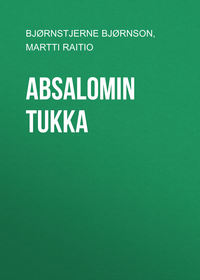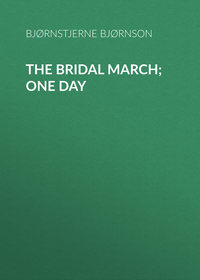 полная версия
полная версияArne; Early Tales and Sketches
"Have you asked her?"
"Yes; but she says she does not want anything."
There was silence for a while.
"But it is cold up-stairs."
"She did not want me to make a fire."
After dinner Arne began work; in the evening he was again with the family in the sitting-room. Then the wife, too, was there. The women were sewing. The husband was busy with some trifles, and Arne helped him; there was a prolonged silence, for Eli, who usually led in conversation, was also silent. Arne thought with dismay that it probably was often thus at his own home; but he realized it now for the first time. Eli drew a long breath at last, as though she had restrained herself long enough, and then she fell to laughing. Then the father also laughed, and Arne, too, thought it was laughable, and joined in. From this time forth they talked of various things; but it ended in Arne and Eli doing most of the talking, the father putting in an occasional word. But once, when Arne had been speaking for some time and happened to look up, he met the eyes of the mother, Birgit; she had dropped her sewing, and sat staring fixedly at him. Now she picked up her work again, but at the first word he spoke she raised her eyes.
Bed-time came, and each one went his way. Arne thought he would notice the dream he had the first night in a new place; but there seemed to be no sense in it. The whole day long he had talked little or none with the master of the gard, but at night it was of him he dreamed. The last thing was that Baard sat playing cards with tailor Nils. The latter was very angry and pale in the face; but Baard smiled and won the game.
Arne remained several days, during which time there was scarcely any talking, but a great deal of work. Not only those in the family room were silent, but the servants, the tenants, even the women. There was an old dog on the gard that barked every time strangers came; but the gard people never heard the dog without saying "hush!" and then he went growling off and laid down again. At home at Kampen there was a large weather-vane on the house, which turned with the wind; there was a still larger vane here, to which Arne's attention was attracted because it did not turn. When there was a strong current of wind, the vane struggled to get loose, and Arne looked at it until he felt compelled to go up on the roof and set the vane free. It was not frozen fast, as he had supposed, but a pin was stuck through it that it might be kept still. This Arne took out and threw down; the pin struck Baard, who came walking along. He glanced up.
"What are you doing there?"
"I am letting loose the vane."
"Do not do so; it makes such a wailing noise when it is in motion."
Arne sat astride the gable.
"That is better than always being quiet."
Baard looked up at Arne, and Arne looked down on Baard; then Baard smiled.
"He who has to howl when he talks had much better keep silent, I am sure."
Now it often happens that words haunt us long after they were uttered, especially when they were the last ones heard. So these words haunted Arne when he crept down in the cold from the roof, and were still with him in the evening when he entered the family room. Eli was standing, in the twilight, by a window, gazing out over the ice which lay glittering beneath the moon's beams. Arne went to the other window and looked out as she was doing. Within all was cozy and quiet, without it was cold; a sharp wind swept across the valley, so shaking the trees that the shadows they cast in the moonlight did not lie still, but went groping about in the snow. From the parsonage there glimmered a light, opening out and closing in, assuming many shapes and colors, as light is apt to do when one gazes at it too long. The mountain loomed up beyond, dark and gloomy, with romance in its depths and moonshine on its upper banks of snow. The sky was aglow with stars, and a little flickering northern light appeared in one quarter of the horizon, but did not spread. A short distance from the window, down toward the lake, there were some trees whose shadows kept prowling from one to the other, but the great ash stood alone, writing on the snow.
The night was very still, – only now and then something shrieked and howled with a long, wailing cry.
"What is that?" asked Arne.
"It is the weather-vane," said Eli; and afterwards she continued more softly, as though to herself: "It must have been let loose."
But Arne had been feeling like one who wanted to speak and could not. Now he said: —
"Do you remember the story about the thrushes that sang?"
"Yes."
"Why, to be sure, it was you who told that one! It was a pretty story."
She said, in so gentle a voice that it seemed as though it were the first time he heard it, —
"I often think there is something that sings when it is quite still."
"That is the good within ourselves."
She looked at him as though there were something too much in that answer; they were both quiet afterward. Then she asked, as she traced figures with one finger on the window-pane, —
"Have you made any songs lately?"
He blushed; but this she did not see. Therefore she asked again, —
"How do you manage when you make songs?"
"Would you really like to know?"
"Oh, yes."
"I hoard up the thoughts that others are in the habit of letting go," he answered evasively.
She was long silent, for she had doubtless been making an attempt at a song or two. What if she had had those thoughts and let them go.
"That is strange," said she, as though to herself, and fell to tracing figures on the pane again.
"I made a song after I had seen you the first time."
"Where was that?"
"Over by the parsonage, the evening you left there. I saw you in the lake."
She laughed, then was still a while.
"Let me hear that song."
Arne had never before done such a thing, but now he sang for her the song, —
"Fair Venevill bounded on lithesome feet,Her lover to meet," etc.Eli stood there very attentive; she stood there long after he was through. At last she burst out, —
"Oh, how I pity her!"
"It seems as though I had not made it myself," said Arne, for he felt ashamed at having produced it. Nor did he understand how he had come to do so. He remained standing there as if looking after the song.
Then she said: "But I hope it will not be that way with me!"
"No, no, no! I was only thinking of myself."
"Is that to be your fate, then?"
"I do not know; but I felt so at that time – indeed, I do not understand it now, but I once had such a heavy heart."
"That was strange." She began to write on the window-pane again.
The next day, when Arne came in to dinner he went over to the window. Outside it was gray and foggy, within warm and pleasant; but on the window-pane a finger had traced "Arne, Arne, Arne!" and over again "Arne." It was the window where Eli had stood the preceding evening.
But Eli did not come down-stairs that day; she was feeling ill. She had not been well at all of late; she had said so herself, and it was plainly to be seen.
CHAPTER XI
A day later Arne came in and announced that he had just heard on the gard that the priest's daughter Mathilde had that very moment started for the town, as she thought, for a few days, but, as had been decided, to stay there for a year or two. Eli had heard nothing of this before, and fell fainting.
It was the first time Arne had seen any one faint, and he was much alarmed; he ran for the maid-servants, they went for the parents, who started at once; there was confusion all over the gard, even the shepherd-dog barked on the barn-bridge. When Arne came in again, later, the mother was on her knees by the bedside, the father stood holding the sick girl's head. The maid-servants were running, one for water, another for medicine, which was kept in a cupboard, a third was unfastening Eli's jacket at the throat.
"The Lord help and bless us!" cried the mother. "It was certainly wrong that we said nothing to her; it was you, Baard, who would have it so. The Lord help and bless us!"
Baard made no reply.
"I said we had better tell her; but nothing is ever done as I wish. The Lord help and bless us! You are always so underhand with her, Baard; you do not understand her; you do not know what it is to care for any one."
Baard still made no reply.
"She is not like others; they can bear sorrow, but it completely upsets her, poor thing, she is so slight. And especially now when she is not well at all. Wake up again, my dear child, and we will be kind to you! Wake up again, Eli, my own dear child, and do not grieve us so!"
Then Baard said, —
"You are either too silent, or you talk too much;" and he looked over at Arne, as though he did not wish him to hear all this, but to go away. As the maid-servants remained in the room, however, Arne thought that he might stay, too, but he walked to the window. Now the patient rallied so far that she could look about her and recognize people; but at the same moment her memory returned; she shrieked "Mathilde," burst into hysterical weeping, and sobbed until it was painful to be in the room with her. The mother tried to comfort her; the father had placed himself where he might be seen; but the sick girl waved her hand to them. "Go away!" she cried, "I do not love you!"
"Good gracious! You do not love your parents?" said the mother.
"No! You are cruel to me, and take from me the only joy I have!"
"Eli, Eli! Do not speak such dreadful words!" begged the mother.
"Yes, mother," she shrieked; "now I must say it! Yes, mother! You want me to marry that hateful man, and I will not. You shut me up here, where I am never happy, except when I am to go out! You take Mathilde from me, the only person I love and long for in the world! O God, what will become of me when Mathilde is no longer here – especially now that I have so much, so much I cannot manage when I have no one to talk with?"
"But you really have so seldom been with her lately," said Baard.
"What did that matter when I had her over at the window yonder!" answered the sick girl, and she cried in such a child-like way, that it seemed to Arne as though he had never before seen anything like it.
"But you could not see her there," said Baard.
"I could see the gard," answered she; and the mother added, hotly, —
"You do not understand such things at all."
Then Baard said no more.
"Now I can never go to the window!" said Eli. "I went there in the morning when I got up; in the evening I sat there in the moonlight: and I went there when I had no one else to go to. Mathilde, Mathilde!"
She writhed in the bed, and again gave way to hysterical weeping. Baard sat down on a stool near by and watched her.
But Eli did not get over this as soon as her parents may have expected. Toward evening they first saw that she was likely to have a protracted illness, the seeds of which had doubtless been gathering for some time; and Arne was called in to assist in carrying her up to her own room. She was unconscious, and lay very pale and still; the mother sat down beside her; the father stood at the foot of the bed and looked on; afterwards he went down to his work. Arne did the same; but that night when he went to bed he prayed for her, prayed that she, young and fair as she was, might have a happy life, and that no one might shut out joy from her.
The following day the father and mother sat talking together when Arne came in; the mother had been shedding tears. Arne asked how things were going; each waited for the other to speak, and therefore it was long before he got a reply; but finally the father said, "It looks pretty bad."
Later, Arne heard that Eli had been delirious the whole night; or, as the father said, had been raving. Now she lay violently ill, knew no one, would not take any food, and the parents were just sitting there, deliberating whether they should call in the doctor. When, later, they went up-stairs to the sick girl, and Arne was left alone again, he felt as though life and death were both up there, but he sat outside.
In a few days, though, she was better. Once when the father was keeping watch, she took a fancy to have Narrifas, the bird which Mathilde had given her, standing beside the bed. Then Baard told her the truth, that in all this confusion the bird had been forgotten, and that it was dead. The mother came just while Baard was telling this, and she burst out in the door, – "Good gracious me! how heedless you are, Baard, to tell such things to that sick child! See, now she is fainting away again; Heaven forgive you for what you have done!"
Every time the patient revived she screamed for the bird, said that it would never go well with Mathilde since Narrifas was dead, wanted to go to her, and fell into a swoon again. Baard stood there and looked on until he could bear it no longer; then he wanted to help wait on her too; but the mother pushed him away, saying that she would take care of the sick girl alone. Then Baard gazed at both of them a long while, after which he put on his cap with both hands, turned, and went out.
The priest and his wife came over later; for the illness had taken fresh hold on Eli, and had become so bad that they knew not whether it was tending to life or death.
Both the priest and the priest's wife reasoned with Baard, and urged that he was too harsh with Eli; they had heard about the bird, and the priest told him bluntly that such conduct was rough; he would take the child home to the parsonage, he said, as soon as she had improved enough to be moved. The priest's wife finally would not even see Baard; she wept and sat with the sick girl, sent for the doctor, took his orders herself, and came over several times each day to carry them out. Baard went wandering about from place to place in the yard, going chiefly where he could be alone; he would often stand still for a long time, then straighten his cap with both hands, and find something to do.
The mother did not speak to him any more; they scarcely looked at each other. Baard went up to the sick girl's room several times each day; he took off his shoes at the bottom of the stairs, laid down his hat outside of the door, which he opened cautiously. The moment he came in, Birgit would turn as though she had not seen him, and then sit as before, with her head in her hand, looking straight before her and at the sick girl. The latter lay still and pale, unconscious of anything about her. Baard would stand a while at the foot of the bed, look at them both, and say nothing. Once, when Eli moved as though about to awaken, he stole away directly as softly as he had come.
Arne often thought that words had now been exchanged between husband and wife and parents and child, which had been long brewing, and which would not soon be forgotten. He longed to get away, although he would have liked first to know how Eli's illness would end. But this he could learn even if he left, he thought; he went, therefore, to Baard, and said that he wished to go home; the work for which he had come was done. Baard sat outside on the chopping-block when Arne came to tell him this. He sat digging in the snow with a pin. Arne knew the pin; for it was the same that had fastened the weather vane. Without looking up Baard said, —
"I suppose it is not pleasant to be here now, but I feel as if I did not want you to leave."
Baard said no more; nor did Arne speak. He stood a while, then went away and busied himself with some work, as though it were decided that he should remain.
Later, when Arne was called in to dinner, Baard still sat on the chopping-block. Arne went over to him and asked how Eli was getting on.
"I think she must be pretty bad to-day," said Baard; "I see that mother is crying."
Arne felt as though some one had bidden him to sit down, and he sat down directly opposite Baard on the end of a fallen tree.
"I have been thinking of your father these days," said Baard, so unexpectedly, that Arne could make no reply. "You know, I dare say, what there was between us two?"
"Yes, I know."
"Ah, well, you only know half, as might have been expected, and naturally lay the greatest blame on me."
Arne answered presently: "You have doubtless settled that matter with your God, as my father has surely done."
"Ah, well, that may be as one takes it," answered Baard. "When I found this pin again, it seemed so strange to me that you should come here and loosen the vane. Just as well first as last, thought I." He had taken off his cap and sat looking into it.
Arne did not yet understand that by this Baard meant that he now wanted to talk with him about his father. Indeed, he still did not understand it, even after Baard was well under way, so little was this like the man. But what had been working before in his mind, he gradually comprehended as the story advanced, and if he had hitherto had respect for this blundering but thoroughly good man, it was not lessened now.
"I might have been about fourteen years old," said Baard, then paused, as he did from time to time throughout his whole story, said a few words more, and paused again in such a manner that his story bore the strong impress of having every word weighed. "I might have been about fourteen years old when I became acquainted with your father, who was of the same age. He was very wild, and could not bear to have any one above him. And what he never could forgive me was, that I was the head of the class when we were confirmed, and he was number two. He often offered to wrestle with me, but nothing ever came of it; I suppose because we were neither of us sure of ourselves. But it is strange that he fought every day, and no misfortune befell him; the one time I tried my hand it turned out as badly as could be; but, to be sure, I had waited a long time too.
"Nils fluttered about all the girls and they about him. There was only one I wanted, but he took her from me at every dance, at every wedding, at every party; it was the one to whom I am now married… I often had a desire, as I sat looking on, to make a trial of strength with him, just because of this matter; but I was afraid I might lose, and I knew that if I did so I should lose her too. When the others had gone, I would lift the weights he had lifted, kick the beam he had kicked, but the next time he danced away from me with the girl, I did not dare tackle him, although it chanced once, as Nils stood joking with her right before my face, that I laid hold of a good sized fellow who stood by and tossed him against the beam, as though for sport. Nils grew pale, too, that time.
"If he had only been kind to the girl; but he was false to her, and that evening after evening. I almost think she cared more for him each time. Then it was that the last thing happened. I thought now it must either break or bear. Nor did the Lord want him to go about any longer; and therefore he fell a little more heavily than I had intended. I never saw him after that."
They sat for a long time silent. Finally Baard continued: —
"I offered myself again. She answered neither yes nor no; and so I thought she would like me better afterwards. We were married; the wedding took place down in the valley, at the house of her father's sister, who left her property to her; we began with plenty, and what we then had has increased. Our gards lay alongside of each other, and they have since been thrown into one, as had been my idea from boyhood up. But many other things did not turn out as I had planned."
He was long silent; Arne thought, for a while, he was weeping; it was not so. But he spoke in a still gentler tone than usual when he began again, —
"At first she was quiet and very sorrowful. I had nothing to say for her comfort, and so I was silent. Later, she fell at times into that commanding way that you have perhaps noticed in her; yet it was after all a change, and so I was silent then, too. But a truly happy day I have not had since I was married, and that has been now for twenty years."
He broke the pin in two; then he sat a while looking at the pieces.
"When Eli grew to be a large girl, I thought she would find more happiness among strangers than here. It is seldom that I have insisted on anything; it usually has been wrong, too, when I have; and so it was with this. The mother yearned for her child, although only the lake parted them; and at last I found out that Eli was not under the best influences over at the parsonage, for there is really much good-natured nonsense about the priest's family; but I found it out too late. Now she seems to care for neither father nor mother."
He had taken his cap off again; now his long hair fell over his eyes; he stroked it aside, and put on his cap with both hands, as though about to go; but as in getting up he turned toward the house, he stopped and added, with a glance at the chamber window, —
"I thought it was best she and Mathilde should not bid each other good-by; but that proved to be wrong. I told her the little bird was dead, for it was my fault, you know, and it seemed to me right to confess; but that was wrong too. And so it is with everything. I have always meant to do the best, but it has turned out to be the worst; and now it has gone so far that they speak ill of me, both wife and daughter, and I am alone here."
A girl now called out to them that dinner was getting cold. Baard got up. "I hear the horses neighing," said he, "somebody must have forgotten them;" and with this he went over to the stable to give them hay.
CHAPTER XII
Eli was very weak after her illness; the mother sat over her night and day, and was never down-stairs; the father made his usual visits up to the sick-room in his stocking feet, and leaving his cap outside of the door. Arne was still at the gard; he and the father sat together of evenings; he had come to think a good deal of Baard, who was a well-educated man, a deep thinker, but seemed to be afraid of what he knew. Arne helped him to get things right in his mind and told him much that he did not know before, and Baard was very grateful.
Eli could now sit up at intervals; and as she began to improve she took many fancies into her head. Thus it was that one evening as Arne sat in the room below Eli's chamber singing songs in a loud voice, the mother came down and brought word that Eli wanted to know if he would not come up-stairs and sing that she might hear the words. Arne had undoubtedly been singing for Eli all along; for when her mother gave him the message he grew red, and rose as though he would deny what he had been doing, although no one had charged him with it. He soon recovered his composure, and said evasively that there was very little he could sing. But the mother remarked that it did not seem so when he was alone.
Arne yielded and went. He had not seen Eli since the day he had helped carry her up-stairs; he felt that she must now be greatly changed, and was almost afraid to see her. But when he softly opened the door and entered, it was so dark in the room that he saw no one. He paused on the threshold.
"Who is it?" asked Eli, in a clear, low voice.
"It is Arne Kampen," he answered, in a guarded tone, that the words might fall softly.
"It was kind of you to come."
"How are you now, Eli?"
"Thank you, I am better."
"Please sit down, Arne," said she, presently, and Arne felt his way to a chair that stood by the foot of the bed. "It was so nice to hear you singing, you must sing a little for me up here."
"If I only knew anything that was suitable."
There was silence for a moment; then she said, "Sing a hymn," and he did so; it was a part of one of the confirmation hymns. When he had finished, he heard that she was weeping, and so he dared not sing any more; but presently she said, "Sing another one like that," and he sang another, choosing the one usually sung when the candidates for confirmation are standing in the church aisle.
"How many things I have thought of while I have been lying here," said Eli. He did not know what to answer, and he heard her weeping quietly in the dark. A clock was ticking on the wall, it gave warning that it was about to strike, and then struck; Eli drew a long breath several times as though she would ease her breast, and then she said, "One knows so little. I have known neither father nor mother. I have not been kind to them, – and that is why it gives me such strange feelings to hear that confirmation hymn."









